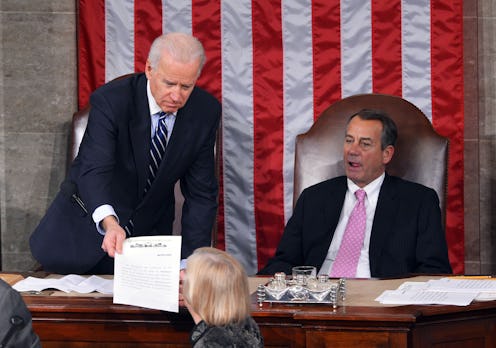News
Faithless Electors May Not Actually Face Big Risks
Whatever Donald Trump may tell you, he lost the popular vote. In fact, he lost it by an estimated 2.5 million Americans and counting, according to the latest from the nonpartisan Cook Political Report. Because of this margin of loss, despite Trump's electoral vote win, many American are urging members of the Electoral College to become so-called "faithless electors," meaning they vote against the candidate to whom they are pledged. However, many states punish faithless electors in various ways, which could cause trouble for would-be mavericks.
I'd like to begin this explanation with a caveat: Despite the Change.org petition calling on the Electoral College to support Hillary Clinton as the popular vote winner, which has over four million signatures at the time of writing, it is highly unlikely that faithless electors will succeed in denying Trump the presidency.
One reason for this, of course, is that many Republican electors are as difficult to persuade away from the party line as the Republican electorate was, and they simply don't mind falling in line when necessary. For a faithless elector plan to work, Republican members would need to choose a candidate other than the one who has their party's nomination. That's highly unlikely to occur. Thus far, the one Republican elector who openly criticized Trump decided to quit his post rather than stay and fight against Trump's election.
Moreover, from my perspective, the liberal opposition is embarrassingly disorganized. Seven Democrats have promised to vote for a moderate Republican instead of Hillary Clinton — calling themselves the "Hamilton electors" — in order to convince Republican electors to join them, though none of them have. What?
Unless the Hamilton electors fall apart before the Electoral College votes, though, it's likely that this election will include at least some faithless electors. The consequences they face vary widely from state to state.
In many states, electors are completely free to vote however they choose. In 26 states and Washington, D.C., though, faithless electors can face a fine or other punishment, though the precedent is murky. None of the 157 faithless electors in American history have ever faced prosecution. Even that threat might be insignificant to some would-be faithless electors, though. The fines imposed by applicable states tend to range from around $500 to $1,000 — hardly an insurmountable cost, particularly in the age of GoFundMe and Kickstarter.
Some states, like Michigan and Minnesota, have laws that theoretically void the votes of faithless electors, replacing them with electors who vote along the party line, but it is far from clear whether such laws would hold up in court. Ultimately, though, other than the imposition of a small fine, it appears that if electors do vote "faithlessly" in 2016, they will likely get away with it.
